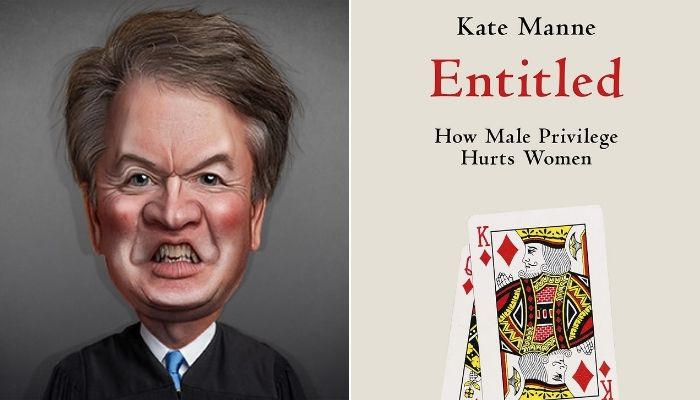Inclusion Policies to learn from Kate Manne’s ‘Entitled’

Written by: Priyanka Chakrabarty
Entitled: How Male Privilege Hurts Women by Kate Manne analyses the socio-cultural phenomenon of male entitlement. Manne has been dubbed as the ‘philosopher of MeToo Movement’. Her works primarily focus on two main aspects- (i) ways misogynistic systems are created which keep women ‘in their place’ and (ii) excessive sympathy shown to male perpetrators of sexual violence. The term Manne coins for this is ‘himpathy’.
This phenomenon ensures that women remain marginalized in social spaces, while exercising their bodily autonomy and within workspaces. It must be understood that women are not a homogenous category. It includes, but are not limited to, cisgender – women, trans women, assigned female at birth, women of color and women belonging to Dalit, Bahujan and Adivasi (DBA) communities. Hence, inclusion policies must focus on all these aspects.
These identities constantly intersect with other social and political identities such as age, ability, and birth place. Due to such diverse and intersectional experiences, Manne remains firm in her assertion (and I agree with her) that there is no universal experience of misogyny and marginalization.
In this article, I will primarily look at workspaces and the gender-based power dynamics that emerge through the lens of Manne’s idea of male entitlement and ‘himpathy’.
Inclusion Policies at Workspaces And The Cost Of Male Entitlement
Manne defines entitlement as “the widespread perception that a privileged man is owed something.” This aspect of “owed something” within workspaces takes the shape of various forms of misogyny and sexism. Manne provides the example of the hearing about Brett Kavanaugh, where he was “furious about being questioned… when the questioner was a woman.” Despite the allegations, he holds one of the highest positions of legal and moral authority, the Supreme Court in the United States.
A similar incident surfaced in India in 2019 when the former Chief Justice of India Ranjan Gogoi was alleged of sexually assaulting his female colleague. The male entitlement which he and his position carries allowed him to not only dismiss the allegations but was also nominated to Rajya Sabha post his retirement. Furthermore, he was a part of the committee which assessed the claims of the complainant. The findings of the committee, to date, have not been made public.
The aspect of a privileged, powerful man being “owed something” is built into systems and workspaces reflect that same patriarchal value. Manne argues that male entitlement is a product of misogyny and continues to harm women. The harm is not as simple as marginalization in workspaces. It has structural and economic impacts.
The Female Labour Force Participation (FLFP) in India is witnessing a historical decline from 30.3% in 1990 to 20.3% in 2020. The key reasons for FLFP decline are barriers to access workspaces, working conditions and wage parity.
Hence, all the reasons stated are structural. Manne suggests that structural issues persist because systems as well as inclusion policies continue to be designed for men and by men, in short, the persistence of male entitlement and that they are “owed something” even at the cost of their female counterparts.
‘Himpathy’ and Inclusion Policies at Workspaces
Manne defines ‘himpathy’ as, “the way powerful and privileged boys and men who commit acts of sexual violence or engage in other misogynistic behaviour often receive sympathy and concern over their female victims”.
As I write this on 21st May 2021, the news of Tarun Tejpal’s acquittal in rape charges alleged against him in 2013 by a female colleague comes in. In 2013, in an email, he expressed an unconditional apology for the “shameful lapse of judgment” that led him to “attempt a sexual liaison.” In 2021 this attempt is framed as a “false sexual allegation.”
In a tedious 572 page judgment, the District and Sessions Court at Mapusa, Goa, stated that the victim’s behaviour was key to determining the charges of sexual assault. In this case, the victim had failed to exhibit a victim-like behaviour. The narrative of the female victim was completely discounted and Tejpal has walked scott-free without being held accountable for his actions.
The phenomena of ‘himpathy’ reflects deeply rooted forms of discrimination. In 1992, Bhanwari Devi who worked as a saathin for Women Development Programme was raped by upper caste men who belonged to the gujjar community. In the next three decades, the echoes of this incident would re-shape sexual harassment laws and inclusion policies in this country. However, Devi continues to fight for justice.
The case went on to reflect the way women and their narratives are discounted when identities of caste, gender, rural backgrounds intersect to create marginalizations. The judgement stated, among other things, that men of different caste cannot participate in gang rape and upper caste men cannot rape lower caste women.
The act of receiving “sympathy and concern over female victims” in this case intersects with patriarchal caste values which protects upper caste men. This protection is accorded by discounting the narratives of lower caste women and denying them justice. The greatest irony of the case of Bhanwari Devi is that the case that gave India laws and inclusion policies surrounding sexual harassment at work continues to fight for justice.
Conclusion
Kate Manne provides us a valuable framework for understanding gendered notions of workspaces. And, how misogyny is a structural issue which either keeps women “in their place” or pushes them out of the workforces. ‘Himpathy’ and male entitlement continue to harm women and workspaces remain hotbed of gender discrimination.
About the author: Priyanka is pursuing her LLB from St Joseph’s College of Law and aspires to be a human rights lawyer. She is a queer woman who loves to read and passionately document her reading journey on bookstagram.
Image credit: Brett Kavanaugh Caricature/Flickr
Ungender Insights is the product of our learning from advisory work at Ungender. Our team specializes in advising workplaces on workplace diversity and inclusion. Write to us at contact@ungender.in to understand how we can partner with your organization to build a more inclusive workplace.
Read our insights about diversity, legal updates and industry knowledge on workplace inclusion at Ungender Insights. Visit our Blog.
Sign up to stay up-to-date with our free e-mail newsletter.
The above insights are a product of our learning from our advisory work at Ungender. Our Team specialises in advising workplaces on gender centric laws.
or email us at contact@ungender.in




